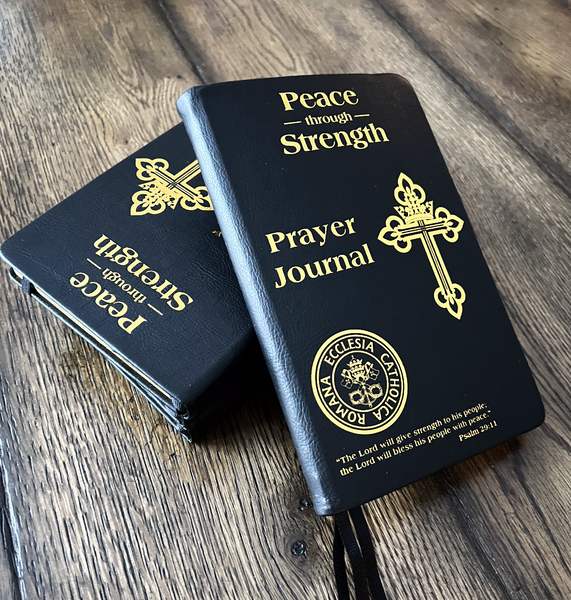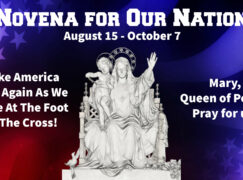

Day 21 – 90 Days to Liberty
Prayer is our outstanding supernatural resource for fighting the wiles of the enemy!
“Prayer is, beyond doubt, the most powerful weapon the Lord gives us to conquer evil … but we must really put ourselves into the prayer, it is not enough just to say the words, it must come from the heart. And also prayer needs to be continuous, we must pray no matter what kind of situation we find ourselves in: the warfare we are engaged in is ongoing, so our prayer must be on-going also.” – St. Alphonsus
You see? Whether it’s a Navy SEAL or a Saint, we admire those who put it all on the line — go “all in!” — those who are totally dedicated to the mission … and God admires them too. Throughout salvation history, we have seen how God responds to this resolute and determined kind of prayer, just as Jesus taught His disciples. It was in Nineveh that the entire city turned back to God and did all that they could, through prayer and fasting, to “demonstrate to” God that they were absolutely resolute in this “turning.” God saw how “serious” they were about this, and He was moved (Jonah 3:3-10). This is yet another story that demonstrates how God – a perfect Father – compels His children to be truly resolute and quite serious when calling out to Him.
The heroes of our faith are the warrior saints who have gone before us. God worked mightily and miraculously through them. Therefore, we must study their ways. How did they remain so well connected, in such strong friendship with God, so that His river of supernatural grace could flow so freely through them? What do these “SEALS for Christ” teach us about the ideal spiritual disciplines, the ultimate daily regimen of prayer?
The following are those top ten ideal and most rock-solid foundational practices of an authentically strong Catholic.
- The Morning Offering
- The Angelus (6 AM, noon, 6 PM)
- Mental Prayer (at least 15 minutes)
- Spiritual Reading (at least 15 minutes)
- Frequent Confession (at least once a month)
- Holy Mass and Communion
- Adoration of the Blessed Sacrament (regularly)
- Acts of Mortification (especially fasting)
- The Holy Rosary
- Brief Examination of Conscience (at night)
Our Daily Prayer for Liberty and for a Holy Spirit Revival
“Free us from every force of oppression, both internally and externally. Grant to our leaders the wisdom to protect and promote our liberties; by your grace may we have the courage to defend them, for ourselves and for all those who live in this blessed land. Heavenly Father, grant a Holy Spirit Revival in our land!” (Based on a prayer by the USCCB)
“Freedom from Indifference” by Fr. James Altman
Dear family, of all the things you can apply the saying “take it or leave it” to, going deeper into our faith is not one of them. We cannot be indifferent to our faith.
When we try to reflect on some principle of our faith – like “indifference” – it is always good to refer to the Catechism to get a working definition, so we all are on the same page. That is my starting point.
So, §2093 states: “Faith in God’s love encompasses the call and the obligation to respond with sincere love to divine charity. The first commandment enjoins us to love God above everything and all creatures for Him and because of Him.” Ok. So good so far.
Then it follows up with §2094 which states: “One can sin against God’s love in various ways” – and then includes the definition for indifference: “indifference neglects or refuses to reflect on divine charity; it fails to consider its prevenient goodness and denies its power.”
Oh, dear family, my head hurts when I try to read something like §2094, something someone cannot seem to put in understandable language. If I asked you, “Exactly what does it mean to fail to consider divine charity’s prevenient goodness and deny its power?” could you answer the question? Don’t feel badly if you couldn’t; I couldn’t either. I had to look up the word “prevenient” and then try to place it in some sort of context of “goodness,” and then try to figure out how does refusing to reflect on divine charity have anything to do with understanding prevenient goodness and, more so, what that has to do with denying its power? Is it any wonder people do not get through the Catechism when they run into roadblocks like this? I say all this just so you know you are not alone. Even priests sometimes struggle with this stuff.
For the record, the definition of prevenient is “preceding in time or order; antecedent.” So indifference, which apparently is neglecting to reflect on divine charity, means failing to consider its “preceding in time or order, antecedent” goodness. But what does that even mean?!?
In the law, there is an ongoing movement to take “legalese” – the formal and technical language of legal documents that is often hard to understand – and put it into “plain English.” So, let us try to do that here.
God loved us first. His love preceded humanity’s creation; it was so great that He willed us into existence so He could share it with us. And then, when we did not reciprocate that love (that’s the whole fall of Adam and Eve thing and every sin afterwards), He still loved us so much that He sacrificed His only Son to hopefully inspire us to love Him back. In fact, He sent His Son even though He knew exactly what some of us would do to Him, because He knew it would be proof of His divine love. It is why St. Paul – so cognizant of this infinite love of God – hardly could keep in the immensity of his praise and worship for God when he wrote to the Ephesians: “Praised be the God and Father of our Lord, Jesus Christ, who has bestowed on us in Christ every spiritual blessing in the heavens. God chose us in Him, before the world began, to be holy and blameless in His sight. He predestined us to be His adopted sons through Jesus Christ, such was His will and pleasure, that all might praise the glorious favor He has bestowed on us in His beloved. In Him, and through His blood, we have been redeemed, and our sins forgiven, so immeasurably generous is God’s favor to us” (Ephesians 1:3-7).
It is no accident that in the Breviary, the Church’s Liturgy of the Hours, this passage is prayed every Monday at Evening Prayer. It, along with the entire Breviary, is a constant reminder of God’s love for us. To pray the Liturgy of the Hours is to contemplate and reflect upon Divine Charity. It is the opposite of indifference.
So maybe by considering the opposite of indifference, we get a better understanding of whether we are or are not indifferent. If we want to know if we have fallen victim to indifference, perhaps the best answer is to ask the question: Do we immerse ourselves daily in contemplating God’s love, so much so that we, like St. Paul, are compelled to praise and worship God in such words as he wrote to the Ephesians? Do we reflect enough upon the magnitude of God’s love, expressed in our very own existence, such that we are compelled to give back to Him even just a tithing of the countless gifts He has given us?
Having just celebrated two Holy Masses of Christian Burial, this thought is fresh in my mind, the words prayed after the final Song of Farewell: “We give You thanks for the blessings which You bestowed upon (decedent) in this life: they are signs to us of Your goodness and of our fellowship with the saints in Christ.”
God’s blessings are indeed signs of His goodness, signs of His infinite love. Are we indifferent to those signs of His goodness and love? Are we so unaware of His signs that we are disconnected from Him, that we can take it or leave it? Or do we, in our daily contemplation, reflect so deeply upon those signs of His love that we are compelled, like St. Paul, to sing out such words as that hymn written way back in 1674 – amazingly enough, before even indoor plumbing and anesthesia: “Praise God from Whom all blessings flow. Praise Him all creatures here below. Praise Him above ye Heavenly hosts. Praise Father, Son, and Holy Ghost.” (From “Let Freedom Ring“)
You can enlist in the United States Grace Force HERE (please recruit family and friends!)
Information on the United States Grace Force can be found HERE
We highly recommend ordering the book “Let Freedom Ring” authored by Fr. Bill Peckman, Fr. James Altman and Fr. Rick Heilman. This amazing book will be a great tool for easy access, highlighting and bookmarking as you traverse through the first 40-days of our 90 Days to Liberty journey with tens of thousands of other special forces prayer warriors!
You can order the book at RomanCatholicGear.com.
You may want to consider using the Hallow App for Lent: Hallow.com
GET YOUR PEACE THROUGH STRENGTH PRAYER JOURNAL …
HERE









